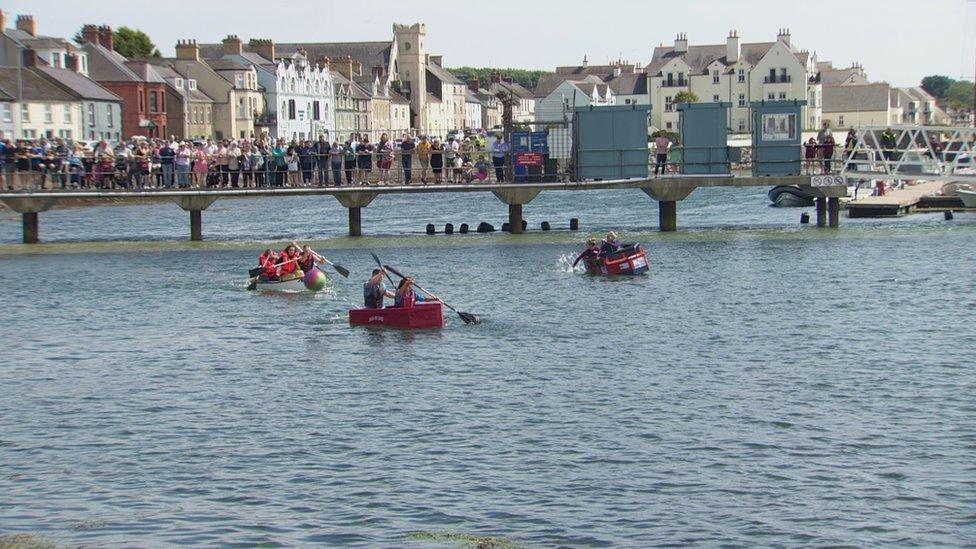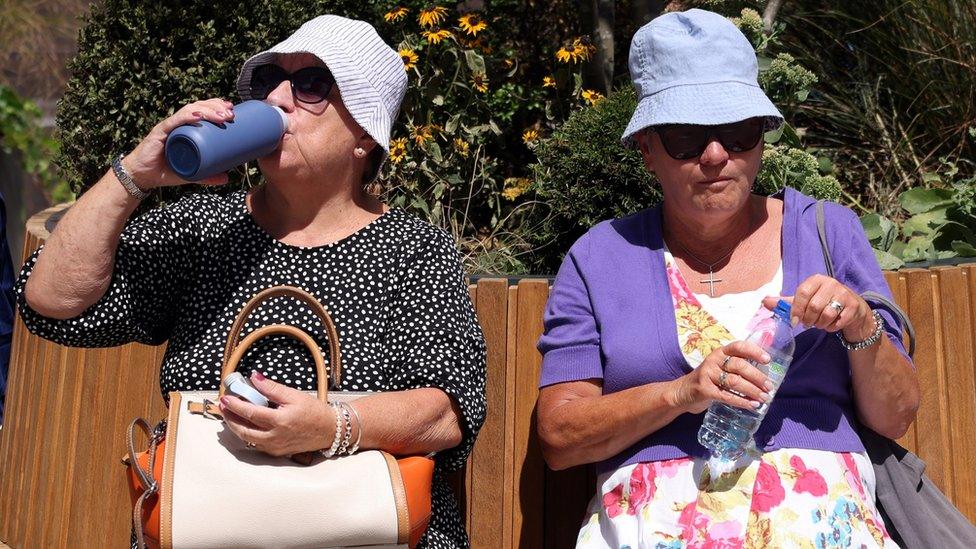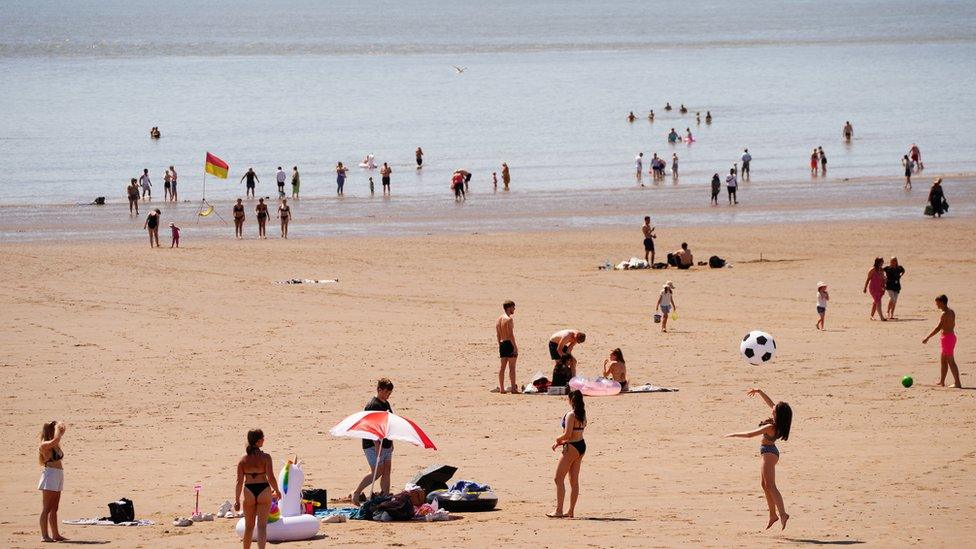Heatwave: Northern Ireland records hottest day of the year
- Published
- comments

Crowds flocked to Portrush beach on Monday
Northern Ireland has recorded its hottest day of the year so far, with temperatures climbing to 31C (87.8F), close to the highest recorded NI temperature.
Thermometers hit 30.8C in Armagh, 31.2C in Derrylin in County Fermanagh, and 30.8C at Belfast International Airport.
Northern Ireland's highest temperature ever recorded is 31.3C in Castlederg, County Tyrone, in July 2021.
In the Republic of Ireland, Dublin's Phoenix Park recorded 33.1C (91.4F).
It is the hottest day in 135 years across the island of Ireland with all time high being 33.3C at Kilkenny Castle in June 1887.
A yellow weather warning is in place in the Republic of Ireland and red and amber weather alerts for extreme heat are in place across Great Britain.
Due to the risks from warm weather, Downing Street said the alerts were being treated as a national emergency.
However, there is no weather warning in place for Northern Ireland.
Katesbridge in County Down, Derrylin in County Fermanagh, the Giant's Causeway also hit 28C by 14:00 BST.

Phoenix Park in Dublin recorded 33°C (91.4F)
Translink has suspended train tickets to Helen's Bay in County Down until further notice, and police said they were in the area due to a build up of traffic and parking issues.
Emergency services in Northern Ireland have said they expect an increase in the number of less urgent calls to 999.
Dr Brid Farrell from the Public Health Agency (PHA) advised people to stay in cool areas and to drink plenty of water due to the heat.
"We would be keen that people avoid being outside between the hours of 11 and 3 in the afternoon. Stay out of the sun, use sunscreen," she told BBC News NI's Good Morning Ulster programme.
Allow X content?
This article contains content provided by X. We ask for your permission before anything is loaded, as they may be using cookies and other technologies. You may want to read X’s cookie policy, external and privacy policy, external before accepting. To view this content choose ‘accept and continue’.
Dr Farrell said it was important to check in on young children and those over the age of 75 as high temperatures can affect them more severely.
The PHA also recommended those with long-term conditions "be careful" over the next 48 hours.

Analysis: Geoff Maskell, BBC weather presenter

The sun was shining at Antrim Castle, near Belfast International Airport, which recorded 28C by early afternoon
I've been doing this job for nine years now and when I started, we'd had a temperature record in Northern Ireland that had stood since 1976.
It had been matched in that time on one day, in 1983, but never broken. It stood for 16,453 days.
The new record lasted three days last year - and we are within 0.1C off breaking it again a year later.
This is the warmest day in Ireland in the past 135 years, but is it going to last? No, it's not. We have some cooler air moving in for Northern Ireland on Monday night, with highs on Tuesday of 20C - 23C.
This has been an exceptional weather event - but other parts of the UK could still see 41C tomorrow.

Climate change has made heatwaves more likely, as well as more intense and lasting longer.
The world has already warmed by about 1.1C since the industrial era began and temperatures will keep rising unless governments around the world make steep cuts to emissions.
The Republic of Ireland's weather service, Met Éireann, said it had expected "exceptionally warm weather" across the island and warned of the dangers of heat stress, especially among vulnerable people, broadcaster RTÉ reported.
'Living in a warming world'
On Sunday, temperatures in excess of 29C (84.2F) were recorded in Dublin's Phoenix Park, home to the Irish President.
Met Éireann's head of forecasting, Evelyn Cusack, told BBC Radio Foyle that Monday will be the hottest day of the heatwave, with temperatures returning to normal across Ireland during the week.
She also warned that heatwaves could become more frequent.
"This is Europe's second heatwave, it started really early in June, temperatures hitting 40C (104F) then the temperatures dropped down a bit, but now we are getting the second heatwave," she said.
"Climate change is here. We are living in a warming world I am afraid."
Irish Water has imposed measures including night-time restrictions on water supplies in 15 areas across the Republic of Ireland.
Heatwave: Northern Ireland records hottest day of the year
Emergency calls only
The Northern Ireland Ambulance Service (NIAS) has said it is expecting an increase in calls and appealed for the public to only contact them in the case of an emergency to "help protect the most vulnerable".
The service apologised for any delays people may experience.
Patients should consider using their own forms of transport to hospital, a spokesperson explained.

People gathered in the sun for the Portaferry Gala Festival on Sunday
With the warm weather seeing more people heading to Northern Ireland's coastline, emergency services have also issued advice to take care near areas of water.
The RNLI urged anyone taking to the water to bring "a means of communication should they need to raise the alarm and to wear a personal flotation device".
RNLI's safety officer Carl Kennedy also issued advice on how beach goers can keep safe.
"First and foremost go to a lifeguarded beach, try and swim between the red and yellow flags if you can," he explained.
"To try and offset the heat, bring plenty of water and soft drinks, and drink more frequently than you would normally do."
Allow X content?
This article contains content provided by X. We ask for your permission before anything is loaded, as they may be using cookies and other technologies. You may want to read X’s cookie policy, external and privacy policy, external before accepting. To view this content choose ‘accept and continue’.
Mr Kennedy also recommended that people wear loose clothing and find a shaded area to avoid sunburn and heatstroke.
Veterinary surgeon and host of BBC Radio Ulster's Alright Pet podcast Dr Rob Adams advised pet owners to avoid "prolonged outdoor activity" and to keep pets indoors during the warm weather.
Speaking on Good Morning Ulster, Dr Adams said that having access to water was key to cooling a dog's temperature down.
Related topics
- Published16 July 2022

- Published15 July 2022
